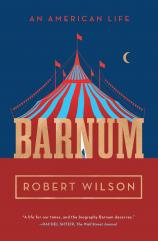Barnum: An American Life
Review
Barnum: An American Life
In his new and enlightening biography, award-winning writer and editor Robert Wilson reveals Phineas Taylor Barnum (1810-1891) as a man of his times --- times in which a young America was growing, and Barnum was resilient, canny and creative enough to grow with it.
Born in Connecticut where he would choose to live most of his life, Barnum was raised in an atmosphere of jokes and pranks, and a youthful stint as a clerk in a general store gave him a penchant for acting a part. He did not absorb the Calvinist streak that ran through the region, but became a Unitarian Universalist and, later, a staunch abolitionist. An early attempt at journalism landed him in jail for libel. He and his wife, Charity, ran their own lottery and, when that activity was banned in Connecticut, opened a boardinghouse.
"...[an] enlightening biography... To most, Barnum represents sensationalism, entrepreneurism and exploitation. Yet he was generally liked among his troupe."
In 1835, Barnum encountered and decided to invest in the management of Joice Heth, an African American woman who claimed to have nursed George Washington in his infancy. Thus began his career “the king of Humbug,” an exhibitor of “curiosities,” who sought to attract, please and convince the public of the existence of every sort of human and animal. Among the oddities that Barnum would exhibit in his New York Museum were a mermaid, a dog boy, a living “human skeleton,” the well-known “original” Siamese twins and, perhaps most famously, a dapper dwarf stage-named Tom Thumb.
Barnum also promoted the lovely, pure-minded singer Jenny Lind, sponsoring an American tour for her at a time when he was trying, Wilson states, “to become a better person.” In his 60s he became a circus promoter and threw in his lot with James Bailey, transforming the traditional circus from tents and sawdust into a stage-worthy international extravaganza.
Wilson also gives note to the lesser-known Barnum, who served in the Connecticut legislature, vocally supporting causes that included temperance and the abolition of slavery and the death penalty. He was a philanthropist, donating start-up funds for, among other endeavors, Bridgeport’s first hospital.
To most, Barnum represents sensationalism, entrepreneurism and exploitation. Yet he was generally liked among his troupe. Tom Thumb once offered “in my small way” to help him out of one of his many financial difficulties. Wilson notes that we live in an “ahistorical” time period, in which all persons are judged by today’s standards, condemned for being products of their times. By that judgment, Phineas Taylor Barnum could be seen as a scoundrel, a con artist and worse. But Wilson, who has dedicated himself to a detailed study of this remarkable character, believes that, underneath the hoopla, Barnum was “genuinely civic-minded,” a man who “lived up to the Founders’ ideal of the citizen politician.”
Reviewed by Barbara Bamberger Scott on August 9, 2019
Barnum: An American Life
- Publication Date: August 11, 2020
- Genres: Biography, History, Nonfiction
- Paperback: 368 pages
- Publisher: Simon & Schuster
- ISBN-10: 1501118714
- ISBN-13: 9781501118715




